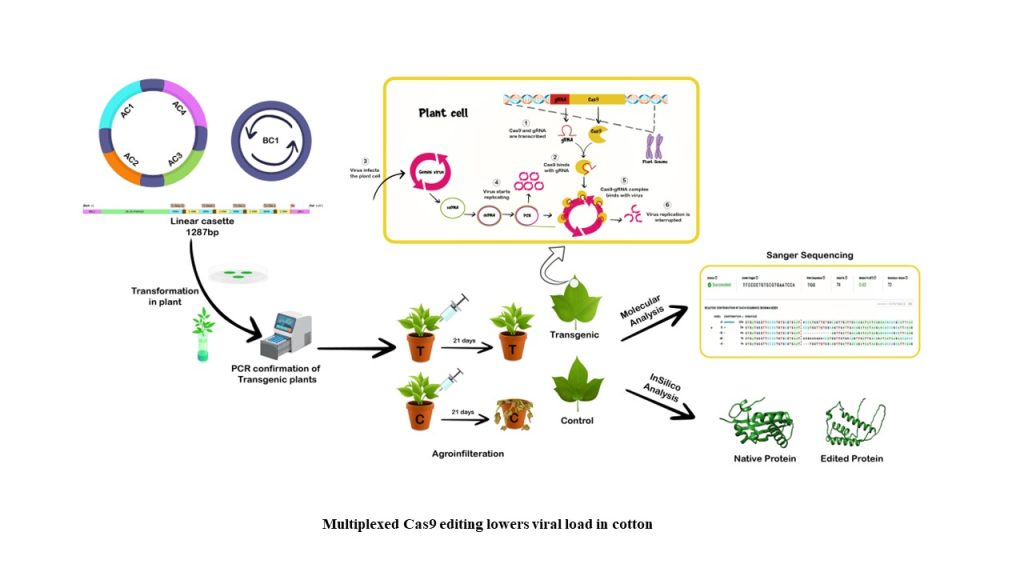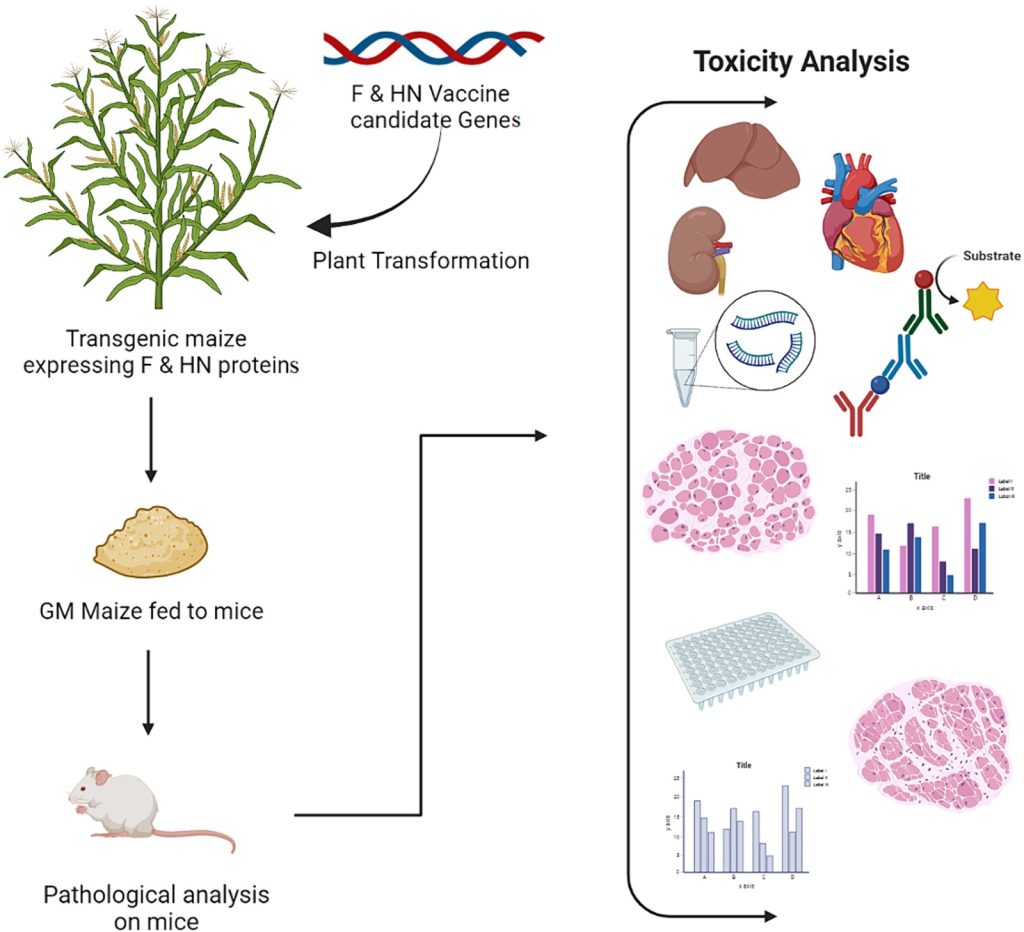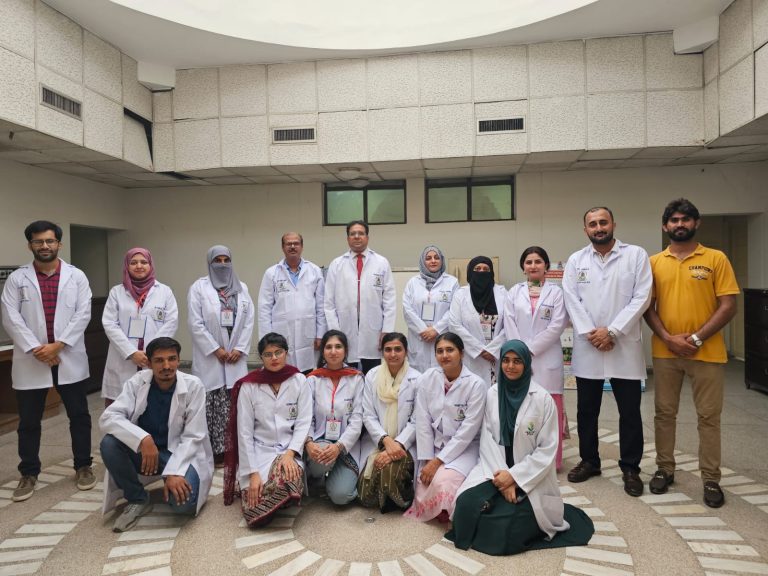Plant Biotechnology Group
PLANT BIOTECHNOLOGY LAB
DESCRIPTION
- Major research focuses on Genome editing by using state of art technology CRISPR Cas9/Cas12 system and transgenic crop biotechnology for the improvement of different traits of crop plants and crop plant protection from insects, pests, weeds, and viruses. Major emphasis of work is on crop plants cotton, which is the backbone of Pakistan economy. Cotton crop regardless of its importance faces severe problem of biotic and abiotic stresses. Biotic stresses accounts for 70% of the total losses and major among those are caused by insects 25-30%, weeds 30% and viruses 30-35%. To combat such problems local cotton varieties were genetically modified by using Bt genes for insects, EPSPS gene for weeds and RNAi technology to control CLCuV. Almost 95-99% control of chewing insects of cotton was attained in transgenic cotton plants and the transgenic germplasm developed is now available in the form of cotton varieties namely CEMB 33, CA 12 and CEMB 66. The first two are already approved and being utilized for the farmers now a days. Similarly, Herbicide resistant cotton developed is showing almost 99% weed control after single spray of glyphosate saving input in the form labor and plant losses occur due to invading weeds in the field conditions. ICRA Asia young Innovation Gold Medal of 2017 has been awarded on account of having mentioned success as reflected by my cv. Cotton leaf curl virus transmitted by the whitefly vector, Bemisia tabaci (Genn.), a vector for CLCuV which has plagued the economy of Pakistan for years and has become a nightmare for the farmers of the country. Previously RNAi approaches has been applied to control this problem but was not proved so successful. Currently The CRISPR/Cas nuclease which is becoming a major tool to cause target-based genome to knock down. Similarly, Cotton Fiber improvement along with physiology of cotton plants are also area of interest which we are focusing on
- Potato sweetening through storage has been addressed through genome editing of vacuolar Invertase gene. The Nutritional improvement of potato for vitamin through genome editing is also in process. The development of resistance against Potato Virus X and Y along with Phytophthora infestans are also area of targeted research
- Beside this we are also considering plant based immunogenic response against different diseases of poultry like NDV and Avian Influenza virus etc. The efficacy of developed edible vaccine is currently in trials and will result in start of new era after being commercialized based on its efficacy.
Key Research Areas
- Plant Biotechnology Group focuses on improvement of crop plants for their important traits by controlling the damage caused by biotic stresses like insects, weeds and viruses
- Fiber improvement of crop plant is also one of the key areas of Research by using transgenic approaches
- Expression of immunogenic protein against Poultry diseases in Plants is also part of study
- Genome editing to control biotic and abiotic stresses and to identify new trait is also being explored in this group


Achievements Products
- Developed double and triple gene cotton lines against insects and weeds
- Developed Next generation Bt and sucking insect resistant cotton lines
- Developed five gene cotton lines
- Successful Characterization of Cotton Epicuticular Wax in Defense against Cotton Leaf Curl Disease (CLCuD) at Molecular and Biochemical level
- Developed an alternative way to control insects through production of methanol on cotton leaves surface
- Developed transgenic cotton lines with improved fiber length strength, and micronaire value by expression of different fiber related genes and transcription factor
- Improvement in Staple Length and Micronaire Value of Desi Cotton was achieved 26.2 and 5.6 respectively through expression of fiber related gene and transcription factor
- Implementation of Novel Plant-based biotechnological approach for production of edible vaccine against Newcastle disease virus of poultry
- Bioengineering of Flavonoid pathway in Cotton
- Successfully established and applied state of art approach of CRISPR Cas9, CRISPR Cas12, CRISPR Cas13 and RNAi against different viruses of Cotton and potato
- CRISPR Cas9 Mediated Genome Editing of Potato Vacuolar Invertase Gene to enhance shelf life was achieved
- Successful implementation of combinational approach to combat notorious insects through Fusion Protein Expression in Cotton
- Improvement of drought Tolerance in Cotton was achieved through expression of transcription factor related to abiotic stresses.
Completed Research Grants
- Control of Cotton Insects through Modified Combination of Bt and Plant Lectin;NRPU -Higher Education Commission of Pakistan (2018-2021 Rs Million: 2.45)
- International Equipment subsidy Grant: A grant for purchase of equipment; Humboldt foundation (2018-2019- Euro: 14900)
- An Alternative Approach to Combat Pink Bollworm Infestation In Cotton; NRPU -Higher Education Commission of Pakistan (2018-2021-Rs Million: 4.59)
- Cas9-mediated gene engineering of the Solanum tuberosum VinV gene to reduce tuber sweetening during long term storage; HEC (2019-2022-Rs Million: 9.7)
- Laboratory Bioassays of Maize Stem Borer for determination of efficacy of Bt proteins; Pioneer Seed Corporation USA (2014-2016- USD: 50,000)
- Transformation of gene constructs and genetically engineered germplasm resources/commercial genotypes resistant to develop cotton leaf curl disease and/or its insect vector; Pak US ICARDA Project (2011-2017-USD: 65,043)
- Development of transgenic cotton with multiple genes resistant to cotton leaf curl virus working as Scientist in PARB Project# 426 to control bollworm weeds and CLCuV; Punjab Agriculture Research Board (2011-2017- Rs Million: 5.281)
- Genetic Improvement of Cotton for Herbicide and bollworms Tolerance working as Scientist in PARB Project to control Bollworm and Weeds; Punjab Agriculture Research Board (2010-2017-Rs Million: 14.580)
- Development and Commercialization of Cotton leaf curl Virus Resistant/Tolerant Indigenous Transgenic Bt and Glyphosate Resistant Cotton Hybrids; Punjab Agriculture Research Board (2012-2016- Rs Million: 13.170)
- Novel approach to generate wide spectrum resistance to all cotton begomoviruses infecting cotton and other cultivated crops; Punjab Agriculture Research Board (2014-2015- Rs Million: 1.10).
Ongoing Research Grants
- Development of Verticillium Wilt and Abiotic stress resistant cotton A collaborative project with Azerbaijan; Islamic Development Bank (2022-2025- USD: 150,000)
- Development of climate smart cotton by editing Arginase (GhArg) genes using genome editing (CRISPR/Cas) tools;LCF HEC (2022-2024- CEMB PART Rs. Million 3.8)
- Development of Climate Resilient cotton resistant to drought and heat through editing of negative regulators by using Cpf1 multiplex system; NSLP funded by PSF (2023-2026-Rs. Million 6.00)
- Regulating NAD salvage pathway in cotton for drought stress tolerance A Collaborative Project with LUMS; NRPU funded by HEC (2022-2025-Rs Million: 9.5)
- Enhancement of Omega-3 Fatty Acids in Maize; NRPU funded by HEC (2022-2025-Rs Million: 3.7)
- Improvement of Alovera Cosmetic Impact on Human Skin through its genetic modification by Human Serum Albumin Gene; Punjab Higher Education Commission of Pakistan (2021-2023-Rs Million: 5.0)
Patents Granted/In Process
- Patent # 142243 Entitled: Novel Transgenic approach to decrease cost of cotton production in Pakistan. Granted 2016 (IPO Pakistan)
- Patent Application # 328/18 Entitled: Novel Plant based Biotechnological approach for the production of edible vaccine against NDVof Poultry. (In Revision) (IPO Pakistan)
- Patent Application # 54/2021 Receipt No 16327 Entitled: Development of Chewing and Sucking Insect Resistant Cotton through Modified Combination of Bt and Plant Lectin Genes. Submitted (IPO Pakistan)
- Patent Application # 222/2022: CRISPR based genome Editing Approach to Combat Insects Pests and Viruses. Submitted (IPO Pakistan)
- Patent Application # 221/2022: CRISPR based genome Editing Approach to reduce Vacuolar Invertase during Cold Storage of Potato. Submitted (IPO Pakistan)
- Patent Application # 223/2022: Plant Based Edible Vaccine against Avian Influenza Virus (H9N2) Virus. Submitted (IPO Pakistan)
Group Picture

Group Composition
Dr Abdul Qayyum Rao qayyum.rao@cemb.edu.pk
Dr Naila Shahid naila.shahid@cemb.edu.pk
Dr Ayesha Latif ayesha.latif@cemb.edu.pk
Dr Saira Azam saira.azam@cemb.edu.pk
Dr Aneela Yasmeen aneela.yasmeen@cemb.edu.pk
Dr Tahir R Samiullah tahir.samiullah@cemb.edu.pk
Doctorate Students
Sahar Sadaqat sahar.sadaqat19@gmail.com
Muhammad Awais awaisgee75@gmail.com
Muhammad Saad Bhutta saad.bhutta46@gmail.com
Huda Rehman Mir hudamir22@gmail.com
Sidra Qayyum sidrahhqayyum@gmail.com
Sehar Zulfiqar sehar.zulfiqar@cemb.edu.pk
Sania Naeem sanianaeem02@gmail.com
Samran Sardar samransardar@gmail.com
Noreen Iftikhar noreeniftikhar0505@gmail.com
Pashma Nawaz pashmanawaz@gmail.com
Narmeen Tariq Zaman narmeentz24@gmail.com
